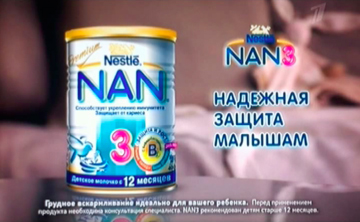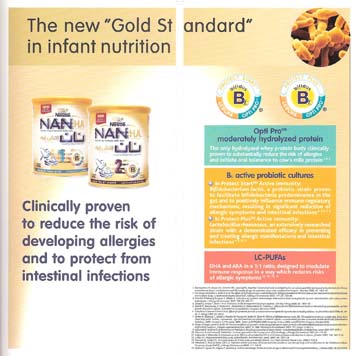Nestle monster leaflet
 Click here to download a pdf of the monster leaflet, with the logo (left) and ten facts Nestlé executives don't want people to know.
Click here to download a pdf of the monster leaflet, with the logo (left) and ten facts Nestlé executives don't want people to know.
Print it double sided and cut in half to make two leaflets.
Further information on the ten points listed on the leaflet is given below.
This information is also available as an isite for reading on a smartphone. There is an QR code on the leaflet that can be scanned to access the isite.
Use our MyMeter iPhone app to raise the boycott when you see someone using a Nestlé product.
Here are 10 facts Nestlé executives do not want you to know. You can help call them to account.
1. Nestlé pushes baby milk around the world in ways that break internationally agreed marketing standards. See examples and email Nestlé - click here.
2. Nestlé's marketing strategies undermine breastfeeding. For example, it claims its formula will 'protect' babies. In reality, babies fed on formula are more likely to become sick than breastfed babies and, in conditions of poverty, more likely to die. Nestlé refuses to stop this strategy. Nestlé's strategy was explained by spoof marketing guru, Mr Henry Nastie, at the Nestlé demonstration in 2010 (see below).
3. Nestlé also puts babies who are fed on formula at unnecessary extra risk. It refuses to warn on labels that powdered formula is not sterile and explain the simple steps to follow to kill any bacteria that may be in the powder. For information on the problem see the World Health Organsiation Guidelines for the safe preparation, storage and handling of powdered infant formula. Nestlé has repeatedly refused to bring its warnings and instructions into line with the WHO Guidelines.
 4. Nestlé claims that it abides by the International Code of Marketing of Breastmilk Substitutes adopted by the World Health Assembly. The Assembly is the world's highest health policy setting body. However, Nestlé's own policies are much weaker. For example, Nestlé's policies allow it to advertise formula brands on television, even in countries where there is poor sanitation and higher infant mortality. Nestlé rejected complaints about it advertising its Nan brand of formula in Armenia in 2011, a country Nestlé itself classifies as "high risk" - click here for analysis.
4. Nestlé claims that it abides by the International Code of Marketing of Breastmilk Substitutes adopted by the World Health Assembly. The Assembly is the world's highest health policy setting body. However, Nestlé's own policies are much weaker. For example, Nestlé's policies allow it to advertise formula brands on television, even in countries where there is poor sanitation and higher infant mortality. Nestlé rejected complaints about it advertising its Nan brand of formula in Armenia in 2011, a country Nestlé itself classifies as "high risk" - click here for analysis.
5. The International Baby Food Action Network (IBFAN) last three-yearly Breaking the Rules monitoring report in 2010 documented examples of violations from around the world. The report contains many examples of Nestlé’s aggressive promotion of formula and inappropriate marketing of baby foods. Nestlé executives said they would act on just 3% of the cases highlighted - click here for details.
6. Nestlé violates the International Code and other Resolutions of the World Health Assembly more than any other company. The Code and Resolutions were adopted by the World Health Assembly to ensure that mothers are not discouraged from breastfeeding and that breastmilk substitutes are used safely if needed. UNICEF says: "Improved breastfeeding practices and reduction of artificial feeding could save an estimated 1.5 million children a year."
7. Nestlé drives down standards for the baby food industry as a whole. For example, in 2007 its competitors tried unsuccessfully to stop it advertising infant formula in supermarkets in South Africa - click here for full details.
8. Nestlé is the most boycotted company in the UK and one of the four most boycotted companies on the planet. Nestlé's Public Affairs Manager has admitted Nestlé is "widely boycotted". Nestlé has rejected a four-point plan from Baby Milk Action that would save babies' lives and ultimately lead to the end of the boycott. Click here for details.
9. The boycott helps to force changes. For example, Nestlé dropped the claim that its formula is "The new 'Gold Standard' in infant nutrition" (below) after this was targeted by Baby Milk Action. Demonstrations have also prompted Nestlé to changes its policies.

10. Nestlé's baby milk marketing is just one issue where there are concerns. Other experts are campaigning about Nestlé's treatment of coffee and dairy farmers, abuse of trade union rights, its exploitation of water resources, child slavery and labour in its cocoa supply chain and other issues. Complaints about some of these issues have been registered with the United Nations Global Compact - click here for the report.
| Attachment | Size |
|---|---|
| monster.pdf | 250.08 KB |
- Webmaster's blog
- Login to post comments






